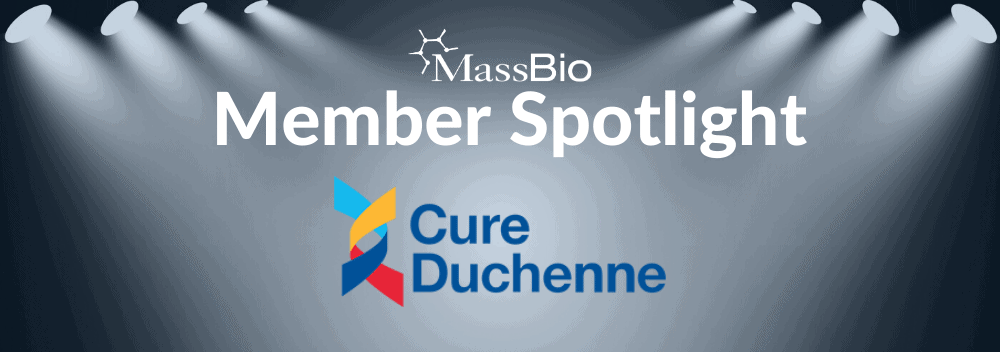
Every month, MassBio spotlights a member company and the great work they’re doing to advance the life sciences industry and support the patients we serve. In December, we spoke with Debra Miller, Founder, and CEO, CureDuchenne. She and her husband started the organization in 2003 after their only son, Hawken, was diagnosed with Duchenne. Debra and her team have brought many firsts to the Duchenne community, including a Duchenne-focused venture philanthropy model, an annual nationwide community education event tour, a Duchenne Physical Therapy Certification program, and a novel Biobank.
Tell us about your organization, its mission, and current initiatives

CureDuchenne’s mission is to improve the lives of everyone affected by Duchenne through accelerating research to find the cure, redefining care, and empowering the Duchenne community. Duchenne is a devastating muscle disease and is the most common form of muscular dystrophy, occurring in approximately 1:5,000 male births. Those affected with Duchenne lose their ability to walk, feed themselves, breathe independently, and ultimately succumb to heart and respiratory failure. But there’s hope through new pharmacological and gene-based therapies.
CureDuchenne is recognized as a global leader in research, patient care, and innovation for improving and extending the lives of those with Duchenne. Our actions fuel hope for families, enable progress for drug development, and extend ambulation for patients in collaboration with biopharmaceutical companies, medical and healthcare professionals, our scientific advisory board, and our board of directors.
CureDuchenne breaks the traditional charitable mold and balances passion with business acumen. Our innovative venture philanthropy model funds groundbreaking research, early diagnosis, and treatment access. With pioneering education and support programs, our organization drives real change for those with Duchenne muscular dystrophy and their loved ones.
How does your organization’s activities help patients now and into the future?
“Embrace this Moment” has been a mantra we’ve lived by, especially this year as we’ve focused our CureDuchenne Cares program on providing virtual events due to COVID-19. While we usually go around the country creating support networks of families, clinicians, and others, this year we’ve done that through Zoom, having coffee (or cocktails) with families. We’re able to keep that sense of being together and give them what they need: conversations about mental health, clinical trials, nutrition, school, physical therapy, insights from all kinds of providers. We’ve even done it in Spanish, reaching global Spanish-speaking communities this year. We’re always looking for life’s silver linings and appreciating all its precious moments!
We’ve also kept moving forward with our venture philanthropy efforts, making several investments this year – never stopping in our relentless pursuit to find treatments and cures. CureDuchenne Ventures deploys donor dollars to fund Duchenne muscular dystrophy drug development with a vision of bringing transformative treatments and cures for everyone with Duchenne. Our robust pipeline of therapies comes from a diverse array of cutting-edge technologies used to treat all aspects of Duchenne. CureDuchenne Ventures’ funding of companies at early and critical times helps their Duchenne projects obtain the important data necessary for those companies to attract future investments. We measure success by seeing a company demonstrate the evidence that its approach is a viable one to take in tackling Duchenne, and then see that company raise the capital needed to continue their progress and conduct clinical trials. In this way, a successful CureDuchenne Ventures investment is a success for the entire Duchenne community.
For example, one of CureDuchenne’s recent investments includes Myosana Therapeutics, which is developing a virus-free gene therapy delivery platform to deliver full-length dystrophin and overcome many of the immune system limitations of viral-delivered gene therapy. CureDuchenne also invested in Dyne Therapeutics (headquartered in Waltham, MA), whose FORCE ™ platform enhances the delivery of exon skipping therapeutics to skeletal, cardiac, and smooth muscle with the potential to improve efficacy and reduce dosing frequency.
Finding and supporting innovation to build chances for the future while embracing this moment is CureDuchenne’s constant path to hope.
What do you see as the biggest challenge facing the life sciences industry today?
The ability for systems to keep up with innovation and ensuring accessibility and meaningfulness to patients and their families are the biggest challenges the life sciences industry faces today. Old ways of developing and paying for treatments cannot be sustained in a world where the FDA is being inundated with several hundred new cell and gene therapies and other innovative treatments per year. The treatments are not the only things that are innovative, either.
It is also innovative to include patients and caregivers’ insights, experiences, and preferences as integral decision-making components of drug development. It is innovative to find new ways of thinking about manufacturing more efficiently and precisely. Increasingly accessible genetic testing and diagnostics is innovative. Finding new ways to base payment arrangements on value is innovative. CureDuchenne is excited by the prospects of all this innovation coming together, has pioneered some of it, and will be there to solve some of it as well. We work to bring every step of this innovation back to the Duchenne community.
What’s next for your organization / what are you focused on in the coming year?
Getting to the other side of COVID-19, to the new ways of being together with the Duchenne community, our other colleagues and friends, is certainly a focus, along with bringing the community back together when it’s safe. We will move ahead with the next strategic phases of the CureDuchenne Biobank, which include continuing to collect samples of skin tissue and blood samples, as well as data from Duchenne patients made accessible to qualified Duchenne researchers. Continuing to embed health equity efforts more deeply into everything we do is paramount. In 2021, we’ll be prioritizing policy strategies around newborn screening and access as well as supporting initiatives including outcomes-based agreements, PDUFA VII, and precision medicine. We look forward to a year of coming together, progress, innovation, and of continued partnership with our biotech and pharmaceutical colleagues in doing all we can to accelerate research and innovation and empower the community with positive solutions.
If you’re interested in being featured in MassBio’s Member Spotlight, please see guidelines here.